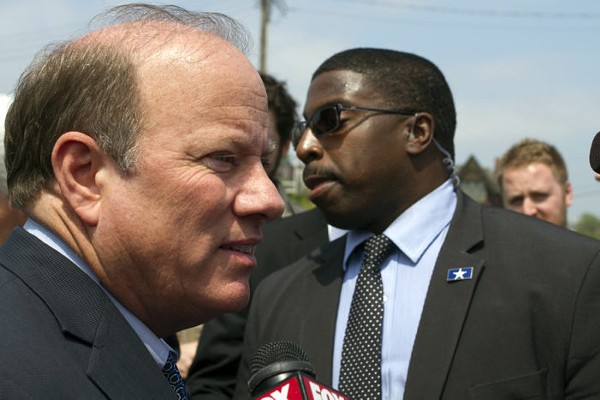3 top Duggan officials schemed to erase emails to hide city's ties to a nonprofit, IG finds
[
{
"name": "GPT - Leaderboard - Inline - Content",
"component": "35519556",
"insertPoint": "5th",
"startingPoint": "3",
"requiredCountToDisplay": "3",
"maxInsertions": 100
}
]
Mayor Mike Duggan's chief of staff Alexis Wiley and two other top city officials ordered public employees to delete emails related to the nonprofit Make Your Date, according to a scathing report by the Detroit Office of the Inspector General (OIG).
Intentionally destroying public records is a crime punishable by up to two years in prison.
The report also found that Duggan gave preferential treatment to Make Your Date (MYD), a prenatal care program whose director was seen with the mayor at her suburban home last year. But the OIG emphasized that "the treatment did not rise to the level of abuse of power."
By contrast, the report concluded that Wiley, a former journalist, "abused her authority" by ordering employees at the city's Office of Development and Grants (ODG) to erase emails that referenced the nonprofit. The report also accuses Wiley of misleading the public by denying that the city used public money to support the program.
The department's chief development officer Ryan Friedrich and deputy chief development officer Sirene Abou-Chakra were "complicit" in carrying out Wiley's orders to delete emails, the report states.
The OIG called the scheme "egregious," "troubling," and "extremely problematic" and recommended that the three officials be "disciplined."
"The OIG finds that the ordering of the deletion of emails is more than a minor or trivial action," the report states. "It threatens the public's ability to trust that their government is operating in a transparent manner."
The Michigan Attorney General's Office also is investigating the deleted emails, which could lead to criminal charges. The AG's office declined to comment, citing the ongoing investigation.
The city downplayed the OIG report in a news release, saying the emails "have been largely recovered and have been available on line on the city’s website for two months."
The OIG said Friedrichs and Abou-Chakra admitted to wrongdoing and expressed remorse. Wiley, on the other hand, was dismissive, saying she "had no concerns about MYD emails being deleted."
"She told the OIG that she did not take any steps to recover the emails once she learned of the problem," the report states. "She said 'I did not view it as that big of a deal. I did not view it as they did something wrong.'"
Wiley initially told investigators she "does not recall" directing employees to delete emails. She later "clarified" that she may have mentioned the emails "were discoverable under" the Freedom of Information Act but denied ordering them to be deleted.
The mayor plans to consult with Human Resources Director Denise Starr to determine what, if any, discipline will be carried out.
The OIG said "there is no evidence" that Duggan knew Wiley had ordered the deletion of the emails until months later. When Wiley told the mayor about the deleted emails, Duggan "took steps to ensure that the emails were recovered," the report states.
“We agree with the OIG’s assessment that the emails’ deletion was not in the best interest of transparent government, which is why the administration made every effort possible to retrieve the emails and post them publicly on the city website,” Detroit's chief financial officer Dave Massaron says in a news release.
But the OIG raised serious questions about Duggan and his administration continuing to conduct city business on private email accounts. Duggan routinely used his private email account when dealing with the city's controversial demolition program, which had come under federal investigation. In 2015, Duggan said he found nothing wrong with using a private email account.
“The OIG finds this practice extremely problematic,” the report states. “When any public servant uses a personal email account to conduct City business, anyone seeking information from that account is at the mercy of that individual to produce the emails on their own. This is in contrast to City email which can be accessed by DoIT to recover the emails with or without the public servant’s knowledge.”
The OIG suggested the city "establish a policy preventing all public servants from conducting City business on personal email accounts."
Duggan's spokesman John Roach says the mayor will be meeting with city attorneys to discuss "a new policy relative to personal use of email."
The report concluded that Duggan "provided preferential treatment" to Make Your Date and acted in a "manner that lacked fairness, openness, and transparency because it excluded other potential agencies, non-profits, and programs who may have been able to help reduce Detroit’s infant mortality."
"The selection of MYD did not follow any established process in which a thorough and complete evaluation of the organization occurred," the report found. "Thus, we conclude his actions violated best practice and good governance."
Stay on top of Detroit news and views. Sign up for our weekly issue newsletter delivered each Wednesday.








